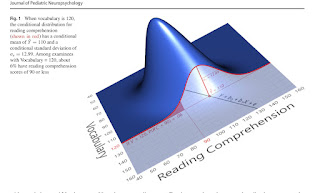Reframing the clouded scientific spectacles of the Flynn effect: A view through two lenses - ScienceDirect
https://www.sciencedirect.com/science/article/abs/pii/S0160289623000168?via%3Dihub
Flynn argued that the Flynn effect was due to an increasing use of "scientific spectacles" among the general population (Flynn, 2010), yet the Flynn effect itself has been viewed through clouded scientific spectacles. Most research has focused on Flynn's main finding: IQ scores have increased over time. Flynn (1987) presumed the effect was a cohort (generational) effect, yet a variety of within- and between-person processes could give rise to the observed secular changes. Many theories have been put forth as to the fundamental cause of the Flynn effect. Frequently ignored is what a specific cause implies the Flynn effect would look like at different levels of analysis and in the context of different research designs. In this paper we present two 'lenses' with which to view a potential causal model of the Flynn effect, in the hopes of closing some of the current gaps emerging from past research. First, we propose an examination of within- versus between-person processes. Relatedly, we propose that the exclusive focus on normed measures of intelligence has hampered understanding of what functional form the Flynn effect might take, particularly during development. Consideration of "raw" intelligence is likely to be fruitful. For our second lens, we consider the framework of age-period-cohort modeling to categorize what kind of effect a given model implies. We examine several causal theories of the Flynn effect through these lenses. Viewed through our lenses, we find that certain causal theories are, perhaps, somewhat incomplete in their specification of all the relevant processes.
https://www.sciencedirect.com/science/article/abs/pii/S0160289623000168?via%3Dihub
Flynn argued that the Flynn effect was due to an increasing use of "scientific spectacles" among the general population (Flynn, 2010), yet the Flynn effect itself has been viewed through clouded scientific spectacles. Most research has focused on Flynn's main finding: IQ scores have increased over time. Flynn (1987) presumed the effect was a cohort (generational) effect, yet a variety of within- and between-person processes could give rise to the observed secular changes. Many theories have been put forth as to the fundamental cause of the Flynn effect. Frequently ignored is what a specific cause implies the Flynn effect would look like at different levels of analysis and in the context of different research designs. In this paper we present two 'lenses' with which to view a potential causal model of the Flynn effect, in the hopes of closing some of the current gaps emerging from past research. First, we propose an examination of within- versus between-person processes. Relatedly, we propose that the exclusive focus on normed measures of intelligence has hampered understanding of what functional form the Flynn effect might take, particularly during development. Consideration of "raw" intelligence is likely to be fruitful. For our second lens, we consider the framework of age-period-cohort modeling to categorize what kind of effect a given model implies. We examine several causal theories of the Flynn effect through these lenses. Viewed through our lenses, we find that certain causal theories are, perhaps, somewhat incomplete in their specification of all the relevant processes.
******************************************
Kevin S. McGrew, PhD
Educational & School Psychologist
Director
Institute for Applied Psychometrics (IAP)
https://www.themindhub.com
******************************************

Kevin S. McGrew, PhD
Educational & School Psychologist
Director
Institute for Applied Psychometrics (IAP)
https://www.themindhub.com
******************************************





